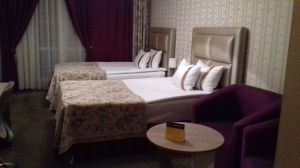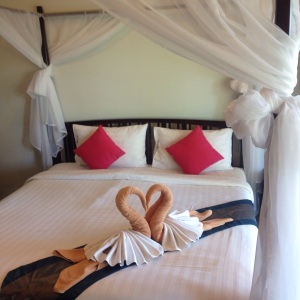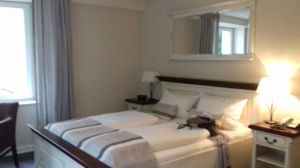It seems remarkably difficult for hotels to put everything in their bedrooms which most or all travellers would want, and a hotel having four or even five stars does not seem to make a noticeable difference. I have stayed in several hundred hotel rooms by now, and have a very clear idea of what I would like to find in my room.
Let’s start with the perfect bed: it needs to be wide enough (and if it’s a double bed that means queen-sized at least) and comfortable – not too hard and not too soft – and it should go without saying, not squeaky or creaky no matter how often sleepers toss and turn. There needs to be a choice of pillows, ideally one medium firm and thick and one medium soft and thin for each sleeper. If even more variables are in the wardrobe or available on request, that is a bonus. I have once or twice found a pillow so unforgivably hard that I have used a folded towel inside the pillow case instead. I don’t understand French-style square pillows, which leave the edges of the mattress without a pillow, and bolsters are unforgiveable and have no place in the 21st century!
Bed linen needs to be suitable for the weather both outside and inside the room, which may include air-conditioning or heating, depending on the time of year, and can be typical for that country so a permutation of duvets, thinner quilts, sheets and blankets are all fine so long as various permutations can be made to suit the likes of the sleepers. Again, spare blankets in the wardrobe for chilly mortals are a plus.

Guests spend most time in their room sleeping, so the room needs to be dark enough and quiet enough to make a good night’s sleep probable. Unless the room has roll-down built-in blinds (often found in Germany and Italy) which provide almost 100% darkness, then curtains with blackout linings are needed and these must cover the whole width and depth of the window, with no gaps for the light to come through. Double or triple glazing is really the only way to guarantee a quiet room although most experienced travellers will carry earplugs just in case (or in case they share a room with a snorer or are unlucky enough to have noisy neighbours).
Now furniture: a bed-side table for each sleeper with enough space for a glass of water, clock, mobile, earplugs, box of tissues, book, spectacles and so on. Having to put these on the floor is not a good plan. There then needs to be a wardrobe with hanging space with plenty of hangers and not the variety which you cannot lift down but only separate the hanger from the hook, the presence of which shows that the hotel believes its guests are thieves. The hangers should be suitable for trousers, dresses, jackets and also skirts and trousers which have loops at each inside waistband so the hangers need to have indents at each end to hold these.
Shelves or drawers are also needed and these may be in the wardrobe and/or in the bed-side table and/or in the desk/dressing table unit. Hotels which have mostly business guests for one night tend to skimp on these but should provide a basic minimum for underwear, tops and accessories. I particularly appreciate hotels which treat the entry area (the part of the room created by carving out space for a bathroom) as a hall, and have hooks on the wall to hang outdoor coats, a shoe rack and a large full-length mirror on the wall and these are most often found in countries where it is cold or rainy at times so guests want to hang their outdoor clothes away from the dry clothes in wardrobe.

I like a safe in the room with easy to follow instructions for putting in our own 4-digit code and the lock has to work faultlessly every time: having a passport stuck in the room safe is no joke when checking out of the room to catch a flight.
What accessories do I want to find? I want at least two waste bins, one in the bedroom and one in the bathroom and I like a box of tissues in each room too. A decent coffee machine is great but if milk is not provided I will need a fridge to keep milk (and white wine for my aperitifs) cool once I have bought them from the supermarket. I don’t need an iron or an ironing board, and I do like a hairdryer but only if it is powerful enough – 1200 watts? – and not wired into the bathroom as I like to dry my hair sitting down in front of the mirror (which I hope is above the desk/dressing table area) which also frees up the bathroom for my husband to shave.
Which brings me to power sockets: there really can’t be too many! I like at least one each side of the bed (preferably two) so that I can charge my kindle and mobile over night while still having them within reach. I like at least two by the mirror above the desk/dressing table for my hairdryer and hairstyler and I like one beside a full length mirror too. A few more for my husband to charge his cameras, phone and tablet and for us to plug-in a kettle are also needed and we don’t want to have to unplug table lamps, the fridge or the TV to use them. Too many hotel rooms seem to me to be designed for male travellers so provide power points above a desk area to plug in a laptop but no mirror for someone to apply make-up or style their hair so the positioning of mirrors is important too – at least one above the desk/dressing table area, and a full length one in an area where you can step back far enough to see yourself in full length and not tucked round the corner where you have to navigate the small table and chairs and the edge of the bed to look in it.
Lighting is as important as power points. There needs to be a hall light, bedside lights, lighting by chairs and over the desk mirror and I like a good bright overhead light too even if it is mostly used when unpacking or packing. I have not forgiven the XXX hotel in Hove, which had 3 lamps in the room, none of which had a light more than 40 watts. I asked reception for some stronger light bulbs but was told they didn’t have any. This was obviously a lie as the lights in the corridor outside the room were a good 100 watt strong. We were tempted to unscrew the fittings and take a bulb into our room, but sense prevailed and instead I used the head torch I had with me to peer into the depths of my case to find what I needed.
We expect free wifi in every hotel nowadays but I also need it to be a secure site and I need it to be able to send photos via What’s App as that is what I do most days when we return to our room from a day sight-seeing.

What about the bathroom? I don’t take baths so will always want a shower and I prefer a large walk through shower, but can cope with a smaller shower cubicle tucked into a corner and if I have to, a shower inside the bath. What I hate are plastic shower curtains instead of a glass screen as they wrap themselves around your damp body in a most unpleasant way.
There needs to be an extractor fan for steam and smells; a bonus is a bathroom mirror with a heated panel that will not steam up. I love magnifying mirrors which extend out from the wall – aimed at shavers, they are perfect for makeup and in one Swiss hotel the magnifying mirror was also illuminated: I think I could have performed simple eye surgery using it. There have to be enough towels. “Enough” in my book is a large towel for after the shower, plus a smaller one for drying my hair plus a hand towel – one of each for each guest – plus a bath mat. A towelling robe and slippers are a good. I expect soap, miniature shower gels and shampoos to be provided; body lotion and hair conditioner are a bonus as is a surprisingly useful mini toothpaste and toothbrush so that before heading off for an early flight I can brush my teeth after breakfast when I have already packed my own toothpaste and toothbrush. And an obvious point which some hotels ignore: there need to be one or two hooks in the bathroom behind the door or on the wall so that clothes being taken off or put on don’t have to be hooked onto the door knob.
Some other aspects of a hotel room can be the view and temperature controls. If the hotel is by the sea or river, then a sea or river view is wonderful but these are usually “extras” which need to be paid for, which is fair enough. I try not to be in a city when it is hot, but air-conditioning is always welcome just in case, providing it can be operated independently of the main hotel settings – and the same goes for heating. I can’t sleep in a room if it’s too hot, either through central heating or the sun!
I think that is about the end of my list, and reading back, it does make me seem really picky but having stayed in so many hotel rooms I have over the years learned what will make my stay in a particular room very enjoyable, or less enjoyable, or even unforgettable for all the wrong reasons. All a hotel owner or manager has to do after all is to provide a room for a good night’s sleep; it shouldn’t be that hard, should it?



